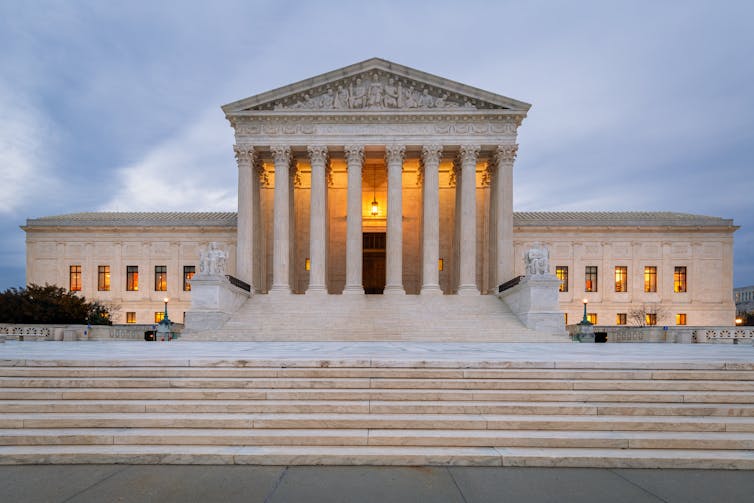President Donald Trump on April 23, 2025, signed an govt order that goals to vary the upper schooling accreditation course of. It asks accrediting companies to root out “discriminatory ideology” and roll again range, fairness and inclusion initiatives on school campuses.
The Dialog requested Jimmy Aguilar, who research greater schooling on the College of Southern California, to elucidate what accreditation is, why it issues and the way the Trump order seeks to vary it.
What’s accreditation and the way does it work?
Accreditation is a course of that evaluates whether or not faculties and universities meet requirements of educational rigor, institutional integrity and monetary stability.
In america, there have been 88 accrediting companies through the 2022-23 faculty tutorial yr.
The companies are formally acknowledged by the Division of Training and the Council for Larger Training Accreditation.
Accreditation just isn’t a one-time stamp of approval, however a steady course of.
At its core, accreditation is a guarantor of high quality in greater schooling.
The method entails self-assessment and peer overview visits.
Faculties usually bear a full overview each 5 to 10 years, relying on the accrediting company.
Establishments should meet requirements for curriculum, college, pupil companies and outcomes, and supply documentation.
Then, federally acknowledged accrediting companies overview the documentation.
Groups, usually comprised of peer reviewers from different faculties, conduct campus visits and evaluations earlier than granting or reviewing accreditation.
Why do universities must be accredited?
Accreditation assures college students, employers and the general public that an establishment meets fundamental tutorial requirements.
It additionally alerts credibility and secures federal monetary assist.
With out it, faculties can not entry key funding sources equivalent to Pell Grants and federal pupil loans.
The funding is important for faculty budgets and college students’ entry to greater schooling.
Accreditation can also be required for skilled licensure in fields equivalent to educating, nursing, drugs and regulation.
It additionally helps make sure that college students can switch credit between establishments.
What does Trump’s govt order do?
President Donald Trump shows a signed govt order within the Oval Workplace on the White Home on April 23, 2025, in Washington.
Chip Somodevilla/Getty Photographs)
The manager order would reshape the school accreditation system, aligning it with the administration’s political priorities. These priorities embody the rollback of DEI initiatives.
The order seeks to make use of federal oversight to weaken institutional DEI insurance policies and priorities. It additionally promotes new requirements aligned with the administration’s interpretation of “merit-based” schooling.
The manager order additionally directs the Division of Training to penalize companies that require faculties to implement DEI-related requirements.
The Trump administration claims that such requirements quantity to “unlawful discrimination.”
Penalties might embody elevated oversight or lack of federal recognition. This might render the accreditation seal meaningless, based on the chief order.
The order additionally proposes a broad overhaul of the accreditation course of, together with:
Selling “intellectual diversity” in college hiring. The manager order argues that selling a broader vary of viewpoints amongst college will improve tutorial freedom. Critics usually interpret this language as an effort to extend conservative ideological illustration.
Streamlining the method for establishments to modify accreditors. Throughout Trump’s first time period, his administration eliminated geographic restrictions, giving faculties extra flexibility to decide on. The brand new govt order goes additional. It makes it simpler for faculties to depart companies whose requirements they disagree with.
Increasing recognition of recent accrediting companies to extend competitors.
Linking accreditation extra on to pupil outcomes. This might shift focus to metrics equivalent to commencement charges and earnings, fairly than commitments to range or fairness.

A 2023 Supreme Court docket ruling that outlawed affirmative motion in college admissions has been some extent of competition within the debate over range, fairness and inclusion in greater schooling.
Joe Daniel Worth/Getty Photographs
The manager order singles out accreditors for regulation faculties, such because the American Bar Affiliation, and for medical faculties, such because the Liaison Committee on Medical Training.
The order accuses them of implementing DEI requirements that battle with a 2023 Supreme Court docket ruling that outlawed affirmative motion in college admissions.
Nevertheless, the ruling was restricted to race-conscious admissions. It didn’t straight handle college hiring or accreditation requirements.
That raises questions on whether or not the order’s interpretation extends past the scope of the courtroom’s resolution.
The ruling has nonetheless been some extent of competition within the debate over range, fairness and inclusion.
The American Affiliation of College Professors and the Attorneys’ Committee for Civil Rights Below Regulation have denounced the chief order.
The teams argue that it threatens to politicize accreditation and suppress efforts to advertise fairness and inclusion.
Nonetheless, the order represents a push by the federal authorities to affect greater schooling governance.



